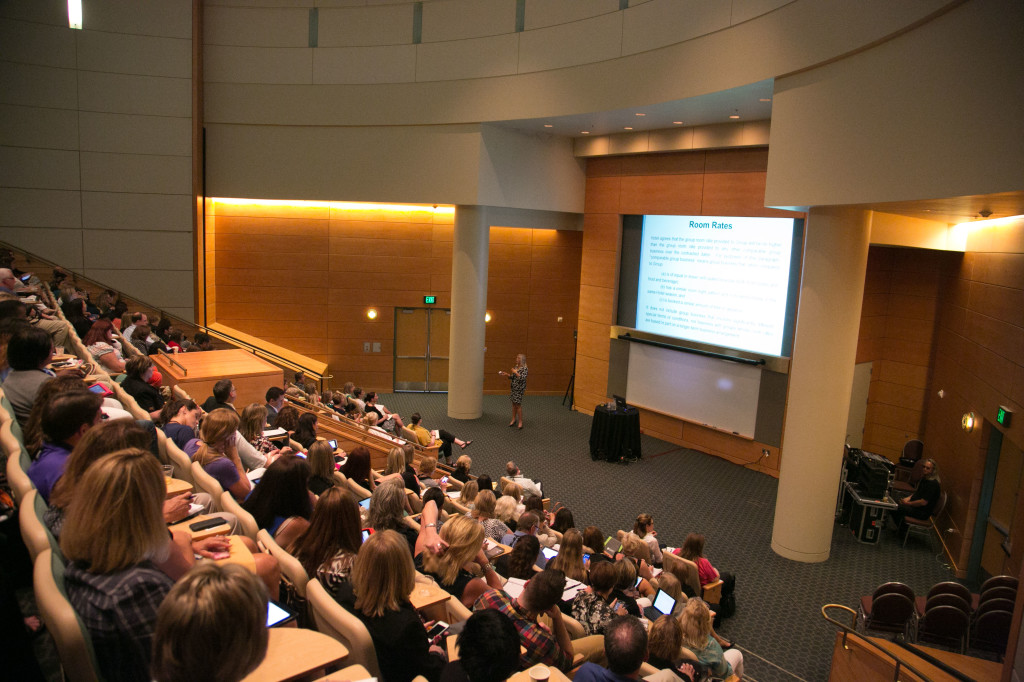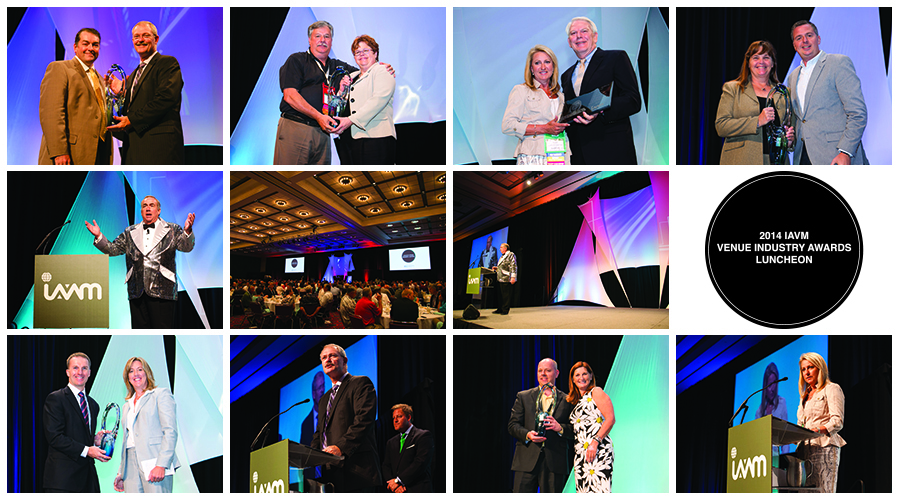Exclusive Services White Paper
The recent Meeting Professionals International World Education Congress featured a session about contract issues, and Sue Pelletier at MeetingsNet offers a great recap. In the article are some related story links, and one of them is “11 Lessons on Negotiating with Convention Centers” that MeetingsNet published last year. It’s a good inside take on how planners view working with convention centers, and No. 8 (Exclusivity: Never Assume) on the list mentions IAVM.
“Two years ago, the International Association of Venue Mangers Inc. released its ‘Exclusive Services Convention Centers/Exhibit Halls White Paper,'” Dave Kovaleski wrote. “While the organization that represents the country’s major centers underscored that ‘exclusive service and third-party vendor contracts are the decision of each facility manager based on the operating needs and political mandates,’ it also called for those facilities that do have exclusives to freely disclose them early in discussions with clients.”
Because of the first, recap article, people are seeing the second article and wanting to read the white paper. Now you can do that. Just click here to read or download it.
(Image: Orange Photography)
Roy Sommerhof on M&T Bank Stadium Improvements
IAVM member Roy Sommerhof made the news this week when he spoke with WBAL in Baltimore (home of VenueConnect 2015) about M&T Bank Stadium’s $35 million improvement project.
“Most notably, all the concession stands have been renovated,” said Sommerhof, vice president of stadium operations for the Baltimore Ravens. “All the equipment inside of them has been replaced. We have more points of sale and more variety on the upper level for fans, and so we think the service will be better.”
You can listen to the full interview below, and if you’re a member who has made the news, please email us at editor@iavm.org so we can feature you on the blog.
Your Venue as One Large Phone Charger
Sure, free Wi-Fi is nice, but it’s useless if your phone’s battery dies. This is where uBeam comes in, and this week the company received some great press on its announcement of a working prototype that will be built for consumers.
In the simplest terms, uBeam is a wireless charging system. It charges your phone via ultrasound, which is converted from electricity through a charging station. The charging station is thin (no larger than five millimeters thick) and can be attached to a wall. Yes, your venue could become one large phone charger.
“This is the only wireless power system that allows you to be on your phone and moving around a room freely while you’re device is charging,” uBeam CEO and Founder Meredith Perry told The New York Times. “It allows for a Wi-Fi-like experience of charging; with everything else you have to be in close range of a transmitter.”
The goal is to have uBeam available to consumers within the next two years with two different charging stations—one for small spaces, such as homes and offices, and the other for larger venues, such as stadiums, conference centers, and music halls.
“We’re going to sell directly to consumers, and we’ll sell them to restaurant chains and hotels—we are going to saturate the market with uBeam transmitters,” Perry said in the Times article. “In addition to your local coffee shop saying it has free Wi-Fi, it will also say it has free uBeam.”
Announcing the 2014 IAVM Venue Industry Award Winners
The 2014 Venue Industry Awards Luncheon—sponsored by Ungerboeck Software International and emceed by Chris Bigelow, founder and owner of The Bigelow Companies—took place during the 2014 VenueConnect Annual Conference & Trade Show in Portland, Oregon. The awards, hosted each year by the International Association of Venue Managers (IAVM), honored exceptional venues and professionals in several categories.
Webinar: Beyond Bobbleheads
The Green Sports Alliance (GSA) will offer a free webinar for IAVM members on Wednesday, August 27, from noon-1 p.m. (CDT) on greening efforts and fan engagement.
“From the millions who attend sports events each year to the exponentially higher number who follow sports closely on TV and the Internet to still others who are simply casual observers, sports reaches into the lives of the vast majority of citizens,” GSA said in a description about the webinar. “And while fan engagement impacts may be harder to track than a waste diversion rate, it is difficult to argue that the potential impact of influencing the attitudes and behavior of billions of followers around the globe is far higher. On top of that, fan engagement around environmental initiatives holds significant potential to drive revenue and attract new sponsorships as well.”
The webinar agenda is as follows:
1. Dave Newport—Director, Environmental Center, University of Colorado & Board of Directors, Green Sports Alliance: Welcoming remarks and presenter introductions.
2. Steve Seiferheld—Senior Vice President, Turnkey Intelligence: Results of recent survey on sports and the environment, based on the responses of more than 1,000 self-identified sports fans.
3. Lisa Boaz—Senior Manager of Marketing & Advertising, St. Louis Rams: “Go Green” platform and other environmental fan engagement initiatives of this long-standing NFL franchise.
4. Matt Williams—Director, Office of Sustainability, University of Florida: Partnership between Gator Athletics, UF Sustainability and nonprofit Neutral Gator to offset Athletics’ CO2 footprint while helping individual fans and the local community.
5. Discussion/Q&A
Do you want to receive a Front Row News weekly digest?
Categories
- Allied (861)
- Architecture (147)
- Arenas (750)
- Career (897)
- Convention Centers (897)
- Education (623)
- Events (1,544)
- Food & Beverage (193)
- Foundation (113)
- Guest Experience (1,497)
- Industry News (2,270)
- Leadership (1,888)
- Marketing (150)
- Membership (2,001)
- Music (213)
- Performing Arts Centers (456)
- Professional Development (409)
- Research (128)
- Safety & Security (442)
- Sports (764)
- Stadiums (611)
- Student (159)
- Technology (516)
- Ticketing (92)
- Touring (82)
- Trends (365)
- Uncategorized (678)
- Universities (218)
- Video (25)
- Young Professional (198)
Twitter Feed
- Twitter feed loading
Recent Posts
- Seton Hawkins of Jazz at Lincoln Center to Deliver Keynote at VenueConnect 2025
- Where Are They Now – 30|UNDER|30 Class of 2023’s Trevor Thomas
- Time Is Running Out! Submit Your Comments on Ticketing Reform by July 7
- IAVM Announces the 2025-2026 Slate of Officers
- Ronnie Burt Named New Chief Revenue Officer of the Jacob K. Javits Convention Center
Categories
- Allied
- Architecture
- Arenas
- Career
- Convention Centers
- Education
- Events
- Food & Beverage
- Foundation
- Guest Experience
- Industry News
- Leadership
- Marketing
- Membership
- Music
- Performing Arts Centers
- Professional Development
- Research
- Safety & Security
- Sports
- Stadiums
- Student
- Technology
- Ticketing
- Touring
- Trends
- Uncategorized
- Universities
- Video
- Young Professional
Archives
- June 2025
- May 2025
- April 2025
- March 2025
- February 2025
- January 2025
- December 2024
- November 2024
- October 2024
- September 2024
- August 2024
- July 2024
- June 2024
- May 2024
- April 2024
- March 2024
- February 2024
- January 2024
- December 2023
- November 2023
- October 2023
- September 2023
- August 2023
- July 2023
- June 2023
- May 2023
- April 2023
- March 2023
- February 2023
- January 2023
- December 2022
- November 2022
- October 2022
- September 2022
- August 2022
- July 2022
- June 2022
- May 2022
- April 2022
- March 2022
- February 2022
- January 2022
- December 2021
- November 2021
- October 2021
- September 2021
- August 2021
- July 2021
- June 2021
- May 2021
- April 2021
- March 2021
- February 2021
- January 2021
- December 2020
- November 2020
- October 2020
- September 2020
- August 2020
- July 2020
- June 2020
- May 2020
- April 2020
- March 2020
- February 2020
- January 2020
- December 2019
- November 2019
- October 2019
- September 2019
- August 2019
- July 2019
- June 2019
- May 2019
- April 2019
- March 2019
- February 2019
- January 2019
- December 2018
- November 2018
- October 2018
- September 2018
- August 2018
- July 2018
- June 2018
- May 2018
- April 2018
- March 2018
- February 2018
- January 2018
- December 2017
- November 2017
- October 2017
- September 2017
- August 2017
- July 2017
- June 2017
- May 2017
- April 2017
- March 2017
- February 2017
- January 2017
- December 2016
- November 2016
- October 2016
- September 2016
- August 2016
- July 2016
- June 2016
- May 2016
- April 2016
- March 2016
- February 2016
- January 2016
- December 2015
- November 2015
- October 2015
- September 2015
- August 2015
- July 2015
- June 2015
- May 2015
- April 2015
- March 2015
- February 2015
- January 2015
- December 2014
- November 2014
- October 2014
- September 2014
- August 2014
- July 2014
- June 2014
- May 2014
- April 2014
- March 2014
- February 2014
- January 2014
- December 2013
- November 2013
- October 2013
- September 2013
- August 2013
- July 2013
- June 2013
- May 2013
- April 2013
- March 2013
- February 2013
- January 2013
- May 2012
- March 2012
- December 2011
- November 2011
- October 2011
Recent Comments
- Frank Bradshaw, Ph.D., CVE on John Meyer, CVE, a Tireless Advocate of Certification for Venue Professionals, Has Died
- Neil Sulkes on Hilary Hartung, Friend to Many in Venue Marketing, Has Left Us
- Jason Parker, CVE on The Devastation of Hurricane Helene and How We Can Support One Another
- Larry Perkins on Touhey Testifies Against Speculative Ticketing Before Congressional Subcommittee
- Peter Secord on Major Players for Planned Elkhart Amphitheater Were in the Mix at VenueConnect





